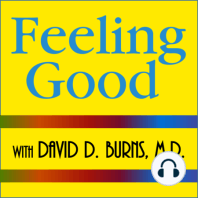50 min listen

352: Ask David: Marijuana, Anger, Ultra-Short Sessions, and more
352: Ask David: Marijuana, Anger, Ultra-Short Sessions, and more
ratings:
Length:
65 minutes
Released:
Jul 10, 2023
Format:
Podcast episode
Description
Featuring Dr. Matthew May In today’s podcast, Matt, Rhonda and David discuss four challenging questions from podcast fans like you: 1. what do you do with patients who use marijuana excessively but have no interest in changing or reducing their use? 2. How do you help clients control their anger? 3. How can you use TEAM if you are only allowed to see clients for 15 to 20 minutes? 4. If David never went into the medical / mental health field, what career path do you think you would have chosen? The answers on the show are live and will differ considerably from the information below, which is primarily to document the full questions that the fans submitted. 1. When a client expresses concerns in multiple areas of their life, such as mood, relationships, and habits, is there a particular hierarchy that you follow? In particular, what do you do with patients who use marijuana excessively but have no interest in changing or reducing their use? I'm particularly interested in your perspective on the hesitancy within the therapeutic community to treat individuals with co-occurring depression and anxiety, alongside marijuana habits or addictions that they do not wish to address. How do you approach and navigate this complex situation, and what are your thoughts on effectively addressing the client's mental health concerns while considering the impact of their substance use on the therapeutic process? With the increasing acceptance and use of medical and recreational marijuana, do you believe it is still morally or ethically justifiable to turn away clients who use marijuana and express no desire to quit? It appears to be a prevalent practice, and I would appreciate your insights on this matter. Casey Zeigler Matt: Great Question, Casey! For me it depends on the pattern of usage and reasons for using Marijuana. For example, if someone gets anxious and then uses marijuana to reduce their anxiety, then I'd be unable to help them treat their anxiety if they weren't willing to set marijuana aside, for a while, to practice some new methods. I might ask, 'imagine you could feel calm and relaxed, but didn't need marijuana to accomplish this. What would it be worth to you, to have that ability? For example, would you be willing to go through an uncomfortable period of deprivation and awkwardly failing at methods to reduce your anxiety, in order to get there?" David: in a Harvard study years ago, individuals with benzo addictions were randomly assigned to two withdrawal groups: Klonopin-only slow withdrawal, and Klonopin slow withdrawal plus group (I think) CBT. The success in terms of numbers of patients who successfully withdrew was far greater in the CBT group. Or, if they used Marijuana to avoid feeling depressed, I'd wonder if they would be willing to set that aside temporarily, in order to prove that they could feel great without Marijuana. My approach is to identify what the patient wants and to be realistic about the approach to achieve those results. There's also long-term data showing that daily use of marijuana is associated with worse mental health, in the long-term. David: I think these decisions have to be individualized, and consultation with a colleague when in doubt can be very helpful.2. I have a question about anger. How do you help clients control their anger? 2. How do you help clients control their anger? I was going to mention it to you as a good topic to cover anyway in a podcast, because it is the one emotion that has not particularly been dealt with in the podcast. This is ironic, since anger is apparently the one emotion we don't acknowledge!). I did a search and there were only two that touched on it and neither covered how someone can learn to control their anger. I have had several clients who talk of how they snap at their children or partners and want to learn to deal with it. Does it work to use a daily mood log in these cases, as the emotions are more like explosive reactions, and maybe less easy to defeat wit
Released:
Jul 10, 2023
Format:
Podcast episode